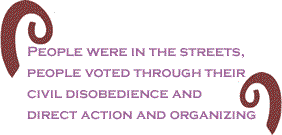
|
|||||||||||||||||||||||

|
|

Custom Search
|
|
 |
|
An Obama Victory Would be a Milestone, but Could Stall Struggles Against Racism Forty-one
years ago, racial tensions - festering since slave times - burst
into the Long Hot Summer in the tri-state area. Thirty-four died
in Ashanti
Alston, a political prisoner activist with the Jericho Movement
and former Black Panther, who was a teenager in
The verdict generated both outrage and despair. Hundreds of people marched that afternoon and “Justice for Sean Bell” signs sprang up throughout the boroughs. But an Al Sharpton-led civil disobedience action in June that might have been the first in a line of battles, instead, turned out to be the denouement. Things died down. It’s
increasingly popular to argue that the fuel for unrest has disappeared
because the problem of racism has receded into Civil Rights Unfulfilled “The history he [Obama] needs to know is the history he rejects,” says Lenore Daniels, editorial board member of the Black Commentator, a weekly online magazine. “He rejects the whole Black Power movement: ‘Just the civil rights were fine, we’ll leave it at that, there was progress.’ [But] the Black Power movement is still relevant. That was a movement talking about economic equality, where King left off.” Histories
of struggles are written by the victors. The movements of 40 years
ago had winners and losers and, like any war, are remembered more
ideologically than objectively. The Civil Rights Act of 1964 ended
Jim Crow and for the first time in
The
result, as Bland and White At
times, Obama sounds more like Richard Nixon than someone concerned
with racism. At the 1968 Republican National Convention Nixon proclaimed,
“To those who say law and order is the code word for racism, here
is a reply: Our goal is justice for every American.” Obama’s response
to the persecution of the Obama did not dwell on the marks of racism, so clear to many of us, in the demography of disaster left by Hurricane Katrina. “I do not subscribe to the notion that the painfully slow response of FEMA and the Department of Homeland Security was racially based,” he said. “The ineptitude was color-blind.” And Obama did not object to the Sean Bell ruling, saying, “The judge has made his ruling, and we’re a nation of laws, so we respect the verdict that came down.” Obama’s
candidacy is seen as an indication that racial barriers no longer
exist in the Movement Politics vs. Electoral Politics Alston feels that since the 1970s, the face of mainstream black activism has moved from a base in communities to big money and corporate sway. “No longer do you have the real radical movement folks that were coming out of grassroots movements,” Alston says. “You have people tied to money, or tied to established political power. What I look at today is that the Sharptons, the Barack Obamas, the Jesse Jacksons and even a lot of these mega-preachers now are not leaders from the grassroots. They’re system leaders that were chosen by either political forces or corporate forces.”
After
attending As
Democratic dominance of national-level black politics accelerated,
communities’ sense of action eroded into the passive live-with-your-fate
mode that presently defines The
key question is whether much of the agenda in the fight against
racial inequality remains unfulfilled. BlackCommentator.com Guest Commentator, Aman Gill, is a freelance writer. Click here to contact Mr. Gill. |
|
Any BlackCommentator.com article may be re-printed so long as it is re-printed in its entirety and full credit given to the author and www.BlackCommentator.com. If the re-print is on the Internet we additionally request a link back to the original piece on our Website. Your comments are always welcome. eMail re-print notice
If you send us an eMail message we may publish all or part of it, unless you tell us it is not for publication. You may also request that we withhold your name. Thank you very much for your readership. |
|
| |
|
| October 16, 2008 Issue 295 |
|
| Executive Editor: Bill Fletcher, Jr. |
| Managing Editor: Nancy Littlefield |
| Publisher: Peter Gamble |
| Est. April 5, 2002 |
Printer Friendly Version
in resizeable plain
text format or pdf
format. |
| Frequently Asked Questions |
 |

|
 |
 |
 |
| |
| |





























 Today,
decades later, why does racial conflict no longer generate the same
kind of heat? Not for lack of ignition. In
Today,
decades later, why does racial conflict no longer generate the same
kind of heat? Not for lack of ignition. In 
 Obama’s
view of a united, post-racial
Obama’s
view of a united, post-racial 






